The Complete Guide to Clear Skin - Understanding and Treating Acne
Acne is one of the most common skin concerns among people of all ages, with over 85% of teenagers experiencing some degree of acne and up to 54% of adults dealing with ongoing breakouts. Those affected by acne can experience a range of symptoms from mild whiteheads and blackheads, to more severe cysts, pustules and inflamed nodules.
It's important for those who have acne to be proactive about their skin health by understanding how their lifestyle may affect their breakouts and taking steps to reduce inflammation on their skin. Eating a balanced diet rich in antioxidants, vitamins and minerals helps support overall skin health as does getting adequate sleep, managing stress levels, exercising regularly and avoiding environmental triggers such as cigarette smoke or pollution.
Additionally, many people find that using certain products such as cleansers gentle exfoliants, and moisturizers specifically designed for acne can also help manage breakouts while helping restore healthy balance to the complexion.
By taking proactive steps to manage their skin health, those who suffer from acne can find relief and help promote clear healthy-looking skin. Taking care of the skin on a daily basis is the best way to keep breakouts at bay, so focus on creating a routine that is tailored to your individual needs. Once this has been established, stick with it and you will be sure to see positive results in no time!

How acne forms?
Acne is caused by a combination of hormones, oil, and bacteria. When these elements mix together in the follicles, they cause sebum to become trapped in the pores. Each pore of your skin is also the opening to a hair follicle, which is made of a hair and sebaceous, or oil, gland. The overproduction of oils can lead to an accumulation of dead skin cells that clog up your pores and create an environment for bacteria to thrive — thus leading to acne breakouts.
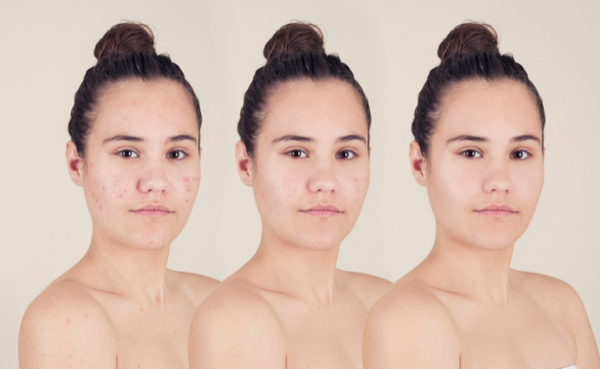
Acne prone skin is a common skin condition that affects many people. It’s important to understand the causes and treatments of acne in order to properly manage it.
7 Most common causes of Acne?
1. Hormones /hormonal acne:
Changes in hormone levels, especially during puberty and menopause, can cause a spike in sebum production, leading to clogged pores and breakouts and can worsen acne.
For women, hormonal changes can be the culprit behind adult acne. Whether it's due to the menstrual cycle or pregnancy, acne can pop up unexpectedly and cause frustration for even the most diligent skincare routine.
High levels of the hormone androgen can be a result of increased stress, which has the potential to stimulate hair follicles and oil glands in pores. This increases an individual's risk for acne breakout.
2. Excess Oil Production:
Oily skin is more prone to clogged pores and acne due to the excess oil that builds up on the surface of the skin when there is too much sebum being produced.
3. Bacteria:
Acne-causing bacteria like P acnes (Propionibacterium acnes) feed off of the excess oils produced by your skin and can thrive in clogged pores, leading to inflammation, redness, and irritation. they are the main causes of acne vulgaris.
4. Dead Skin Cells:
When dead skin cells build up they can trap oil inside pores; this creates an ideal environment for bacteria to thrive and cause further breakouts.
5. Improper Skin Care:
Not cleansing the skin properly, using harsh products, or not exfoliating can all lead to a build-up of oil and dirt on the skin that can cause acne. Some hair products, including sprays, pomades and gels, may worsen acne.
6. Stress:
Stress is known to trigger hormones which can in turn lead to an increase in sebum production and inflammation, both of which are contributing factors to breakouts.
7. Diet:
Eating an unbalanced diet that is high in processed foods, sugar, dairy, and other unhealthy ingredients can all increase your chances of developing acne due to the inflammatory properties found in these foods.
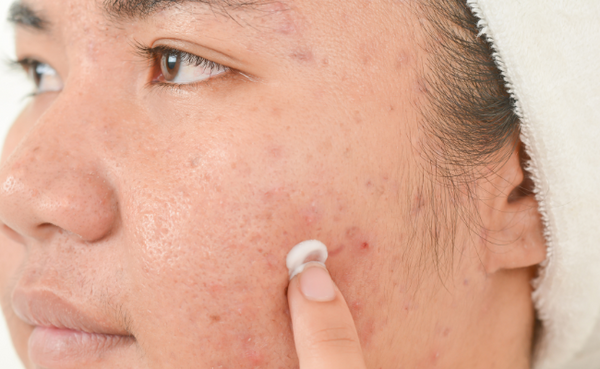
Clogged pores can lead to different forms of acne, including blackheads and whiteheads (sometimes referred to as comedones), pimples and cysts.
Different types of Acne?
Acne can vary in severity and type, from mild whiteheads and blackheads to more severe cysts, pustules, and inflamed nodules. It is important to understand the differences between these types of acne so that you can choose the best course of treatment for your skin.
Mild forms of acne such as whiteheads or blackheads are caused by a buildup of sebum that has become blocked inside the pores.
More severe cases such as cystic pimples or nodular breakouts are due to a deep infection that extends further beneath the surface of the skin and requires specific medications to clear up completely.
What are the best skincare routine steps to combat acne and get rid of pimples fast:
1) Cleanse:
Choose a cleanser that is tailored to your skin type and gently massage it into the skin for 1-2 minutes. Rinse off with lukewarm water, then pat dry. Use a gentle cleanser and avoid harsh chemicals which can dry skin making acne worse.
2) Exfoliate:
Use an exfoliant (either physical or chemical) 2-3 times a week to remove dead skin cells, help unclog pores, and reduce inflammation.

3) Tone:
After cleansing, use a toner to help balance out the pH levels of your skin and prep it for the next steps in your routine.
4) Treat:
Depending on the severity of your acne, you may want to incorporate an acne treatment product such as benzoyl peroxide or salicylic acid treatment regimen.
5) Moisturize:
Choose a light, non-comedogenic moisturizer and apply it gently to the skin after treatment. Products containing aloe vera or hyaluronic acid are applied to the skin, it helps to lock in moisture, reduce inflammation and soothe redness.
6) Sun protection:
Apply SPF of at least 30 every morning before leaving the house to protect the skin from sun damage and prevent further breakouts. Unprotected sun exposure can cause acne flare-up and make the breakouts worse.
7) Reevaluate:
Keeping in mind that everyone’s skin is different, regularly evaluate your skincare routine and tweak it accordingly depending on how your skin is reacting and responding over time.
By following these steps, you can help reduce inflammation, fight bacteria, and promote healthy-looking skin while keeping acne under control. If you're still having trouble with acne despite taking all these steps, then consider seeking professional help.
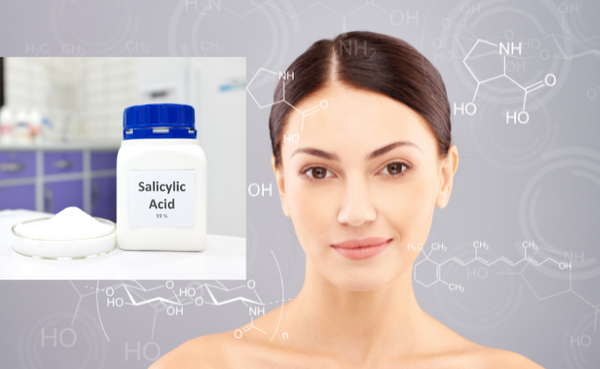
Over-the-counter treatments:
Here are some ingredients when used in topical treatments can reduce acne, treat skin inflammation and unclogs pores when added the daily skin care routine.
1. Salicylic Acid:
A type of beta hydroxy acid, salicylic acid is a popular ingredient in many acne-fighting products as it helps to remove dead skin cells and unclog pores. It works by helping to break down hard, oily substances that can clog pores and lead to blemishes. Salicylic acid also helps unclog existing pores and reduce inflammation, redness and swelling associated with acne.
If you are considering using salicylic acid, consult your dermatologist first for professional advice.
2. Benzoyl Peroxide:
This is an antibacterial agent that works by killing the bacteria responsible for inflammation and breakouts, making it an effective treatment for acne-prone skin.
3. Glycolic Acid:
This ingredient is an exfoliant that helps to slough away dead skin cells, which can result in a clearer complexion. It also helps to brighten the skin and reduce discolouration associated with acne.
4. Retinol:
Retinol is a vitamin A derivative that helps to speed up cell turnover, minimize the appearance of pores, and reduce blemishes.
5. Bakuchiol
Bakuchiol (an alternative to retinol) can be helpful in fighting acne. Research has shown that the active ingredient in bakuchiol, a compound called Bakuchiol, has anti-inflammatory and antimicrobial properties that may help reduce breakouts and other signs of acne.
Additionally, studies suggest that bakuchiol helps to regulate oil production and provides antioxidant protection from free radical damage caused by environmental stressors. Furthermore, since bakuchiol is generally gentle on the skin, it may be suitable for those with sensitive or irritated complexions.
6. Aloe Vera:
Aloe vera is an effective remedy for fighting acne. It has anti-inflammatory properties that help reduce redness and swelling caused by acne. Aloe vera gel can be applied directly to the skin or taken orally as a supplement. Applying aloe vera gel helps soothe skin irritation, improve circulation, and protect against bacterial growth that often leads to breakouts. Additionally, its antibacterial action helps prevent further infection from occurring on the skin's surface. The natural enzymes found in aloe vera also assist in breaking down dead skin cells which often clog pores and lead to more acne outbreaks.
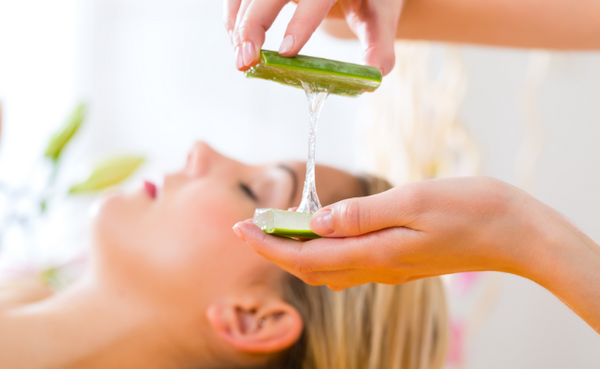
7. Essential Oils:
Combining essential oils with a carrier oil, you can create natural home remedies for acne that can help manage breakouts without harsh chemicals. Essential oils such as tea tree and lavender are known for their anti-inflammatory properties which help reduce redness and swelling caused by acne and soothe the pimples fast.
Additionally, these facial oils have antibacterial action which helps to fight the bacteria that often cause incorporating all seven steps into your skincare routine, you can help treat and prevent breakouts for healthier and clearer skin.
8. Green tea
Green tea can be helpful in acne treatment in both oral and topical applications. Drinking green tea, you can gain the benefits of its natural antioxidants and anti-inflammatory compounds, which help to reduce inflammation and bacteria on the skin. You can also apply topically green tea extract. It helps to soothe, nourish and protect the skin from environmental damage caused by pollutants or UV exposure.
It also helps to pores clear, has antibacterial properties and helps decrease acne and soothe acne flare-ups.
9. Azelaic acid
Azelaic acid can be as effective as conventional acne treatments. An azelaic acid is a great option for acne-prone skin. It is generally considered to be safe and works in two ways: it helps reduce inflammation, which can help reduce redness and swelling, and it also kills bacteria that can cause breakouts.
By incorporating these products into your skincare routine, you can help treat existing breakouts while also preventing future ones from forming.
Remember to start slow with new products, as some of these ingredients can be irritating to sensitive skin. If there’s any irritation or discomfort, stop using the product immediately and consult a dermatologist.
With acne, it is important to remember that everyone’s skin is different and not all remedies will work for every individual. However, by closely monitoring your habits, diet, stress levels and skincare routine
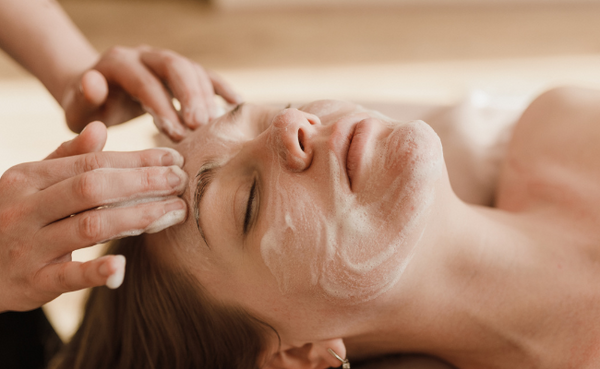
Acne FAQ:
Q: What are some common misconceptions about acne?
A: Some common misconceptions about acne include that it is caused by poor hygiene or eating certain foods and that it can be cured with a single product. In reality, acne is caused by a combination of hormones, oil production, bacteria, and genetics; and the best way to treat it is through regular skincare maintenance and lifestyle changes.
Q: What are some natural remedies for treating acne?
A: There are several natural remedies for treating acne such as applying tea tree oil directly to affected areas, using honey masks regularly, drinking plenty of water to flush out toxins from the body, and incorporating anti-inflammatory foods like turmeric into your diet. Additionally, regular cleansing and exfoliating the skin can help unclog pores and keep acne under control.
Q: What are some lifestyle changes I can make to prevent or lessen breakouts?
A: The best way to prevent or lessen breakouts is to maintain a balanced diet, stay active, reduce stress, get enough sleep and avoid touching your face as much as possible.
Additionally, create an effective skincare routine tailored to your skin type that includes daily cleansing, exfoliating 2-3 times a week, using a toner after cleansing, applying a treatment product if necessary (such as benzoyl peroxide), moisturizing with a non-comedogenic moisturizer after treatment products have been applied, and wearing sunscreen every morning to protect from sun damage.
Q: Can I use face cleansing oil / facial oil in an anti-acne routine?
A: When it comes to acne-prone skin, incorporating oils into your skincare routine can be a game changer. But, before you run to the store to grab any old oil, it's important to choose a lightweight and non-comedogenic product that's specifically designed for your skin type. Olive Squalane or Jojoba oils are great options because they're similar to the natural oils produced by your skin and can help balance out excess oil production. Just a few drops applied after cleansing and before moisturizing can help lock in moisture, prevent dryness, and ward off pesky breakouts. Remember, when it comes to skincare, one size does not fit all. Be sure to consult a dermatologist if you're unsure which products are right for you.

Achieving clear and healthy-looking skin can be attainable by following a few simple steps and considering some lifestyle changes. Don't let acne take over your life - take control today! However, if you're still experiencing breakouts despite these efforts, it may be time to seek professional advice from a dermatologist or skincare expert.
They will be able to provide you with personalized solutions to meet your skincare needs. Wishing you the best of luck on your journey towards clear skin!
How to get rid of acne scars?
Acne scars are the result of inflamed blemishes caused by skin pores engorged with excess oil, dead skin cells, and bacteria.
The inflammation causes the skin to create excess collagen which leads to scarring. If you're looking for ways to reduce or get rid of acne scars, some options to consider include chemical peels, laser treatments, and micro-needling.
For milder scarring, over-the-counter products with retinoids or glycolic acid may help reduce the appearance of scars. If these methods don't provide desired results, consult a dermatologist for more intensive treatments such as dermabrasion or punch excision. Ultimately, the best way to treat acne scars is to find a method that works for you and your skin type.
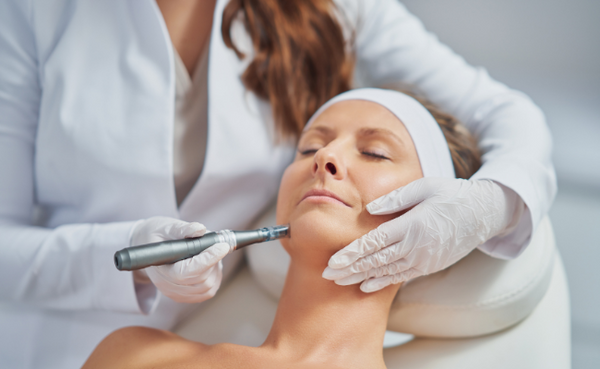 Seeking professional help:
Seeking professional help:
If you're dealing with moderate or severe acne, don't hesitate to seek the advice of a professional who can explore with you appropriate treatment and acne medication options for your existing acne.
Whilst mild or moderate acne can be treated with over the counter treatment options such as salicylic acid or benzoyl peroxide, moderate to severe symptoms (severe acne), in particular, the appearance of nodules and cysts warrant attention from a GP who can prescribe oral antibiotics to reduce bacteria and control acne. Proper treatment is key to controlling acne and minimising scarring in the long run.

As for your own efforts, resist the urge to pick or squeeze those acne bumps – these actions often lead to permanent marks. Remember, results won't show up overnight – but with patience and dedication, a clearer, healthier complexion can be yours.
Potion Organic
Some of our products in the range can help with your skincare routine when treating acne. Our facial oil and cleansing oil are formulated with natural oils that are known to have powerful antibacterial and anti-inflammatory properties, which can help reduce the appearance of acne and other skin blemishes. The natural oils in this cleanser also provide nourishment to your skin while removing excess dirt, makeup, and bacteria from your face.
Potion Organic moisturisers can help fight acne. Our products are formulated with natural and organic ingredients that are specifically chosen to treat skin conditions such as acne. The active ingredients in our moisturisers, like aloe vera, lemongrass oil and jojoba oil, all possess anti-inflammatory and antiseptic properties which help soothe inflammation while fighting bacteria on the skin's surface.
Additionally, our moisturisers contain hyaluronic acid which helps keep the skin hydrated without clogging pores, reducing the chances of breakouts caused by dryness or dehydration. Furthermore, antioxidants like Vitamin E, Q10, and Astaxanthin provide additional protection from environmental stressors that may lead to blemishes or irritation. Studies have shown acne patients have higher oil production and lower antioxidant level.
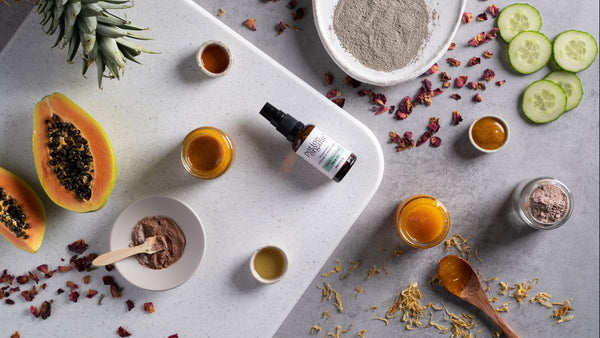
Our cleaners contain natural ingredients like papaya extract, chamomile oil, and Bromelain which have antibacterial and antiseptic properties that can help reduce inflammation. We also use a combination of essential oils with antimicrobial properties to help clear up breakouts faster. When used regularly as part of your daily skincare routine, Potion Organic cleansers can be highly effective in fighting acne-causing bacteria and keeping your complexion looking clear and healthy.
Finally, Potion Organic Deep Detox Face Mask contains French green clay and green marine flora that helps draw out toxins from your skin, fighting acne-causing bacteria in the process. Additionally, our Potion Organic Radiance Promoting Face Mask contains pink clay designed for calming inflammation - making it perfect for treating active breakouts. Using these masks on a regular basis can help prevent breakouts from occurring and keep your complexion clear and healthy! Try them today, and see the amazing results for yourself!
Thanks to their natural ingredients, both of our face masks are gentle enough to be used as part of an everyday facial routine, while still providing powerful cleansing benefits.
Should you want to try any of our products, please get in touch via email: info@potionorganic.com for free samples and skincare advice.
You can also check out our free nutrition guide with tips and advice on what to eat to combat acne.
